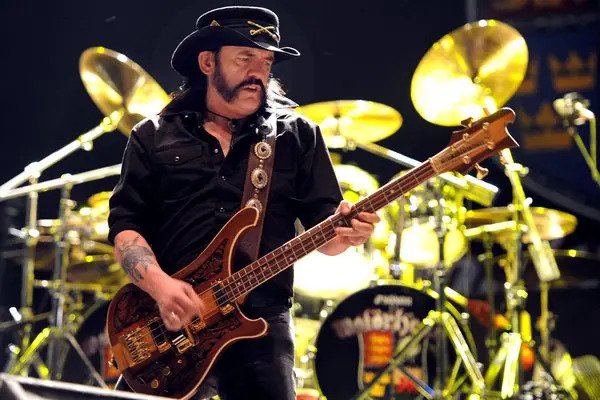At his favorite Sunset Strip haunts, Lemmy shared whiskey-soaked tales, a backdrop to his larger-than-life persona. These stories, whether at bars or in the media, revealed his no-nonsense approach to music and life.
Born in Stoke, Lemmy’s northern roots and upbringing shaped his strong opinions. From being Jimi Hendrix’s roadie to Hawkind’s rise and his pioneering in speed metal, Lemmy navigated the music scene with a clear vision. He criticized acts he deemed as fake or lacking substance, a trait that defined his journey.
Lemmy didn’t hold back in his criticism of certain bands. Here are five bands he disliked:
Five bands that Lemmy hated:
The Rolling Stones
It should come as no surprise that Lemmy was a fan of The Beatles given his love of rock ‘n’ roll and his upbringing in the 1960s, even in light of his affinity for heaviness and the Liverpool band’s well-known pop aesthetic. He was aware, nevertheless, that the “Fab Four” were exceptionally talented songwriters in their own right. Their working-class background, shaped by his upbringing in the rough port city on the frigid banks of the Mersey, also struck a chord with him.
On the other hand, he felt very differently about The Rolling Stones, their southern equal. He said that the band “Gimme Shelter” was just a bunch of middle-class “mummy’s boys” who were awful performers.
In White Line Fever, he told, “Brian Epstein cleaned them up for mass consumption, but they were anything but sissies. They were from Liverpool (…) a hard, sea-farin’ town, all these dockers and sailors around all the time who would beat the piss out of you if you so much as winked at them. (…) The Rolling Stones were the mummy’s boys—they were all college students from the outskirts of London. (…) The Stones made great records, but they were always shit on stage, whereas the Beatles were the gear.”
Limp Bizkit
Lemmy was quick to criticize the music and gimmicks of the short-lived nu-metal zeitgeist that he perceived in the late 1990s. In an interview with Ear Candy in 2000, Lemmy took aim at nu-metal, specifically criticizing Slipknot, Tool, and Limp Bizkit.
He said, “People like Limp Bizkit, I don’t understand it,” he said. “I don’t understand their success. What the f*** is this, it’s just rubbish! You’re just garage attendants with f***** gas masks on. And I mean, I don’t mind kids having their own thing, I’m all for it. When you’re 17, you want a 17-year-old band to play for you, you don’t want these old f**** like me.”
The Clash
Punk was Lemmy’s thing; the movement was spiritually akin to Motörhead. The aural character was fueled by leather, rage, or pure rock ‘n’ roll; the similarities were evident, and it goes without saying that the songwriter of “Ace of Spades” enjoyed a lot of music from this era. He was very open in saying that the American pioneers, Ramones, were his favorites. He did, however, frequently express his lack of admiration for their British counterparts, The Clash.
Back in 2009, he told Spin, “I never liked The Clash, They sounded like old music, dressed up as punk. The Ramones were geniuses, though. Joey especially had a nose for rock’ n’ roll, and we were friends, although we weren’t close when he died. I hate to see people on the way out; I prefer to remember him as he was.”
Just a few years later, Lemmy proved his thesis regarding The Clash by differentiating them from Ramones in Louder Than War. He said, “I never had time for the Clash and their pretend politics, but the Damned and the Ramones were great rock ‘n’ roll bands.”
The Who
Lemmy didn’t hesitate to criticize other members of the classic rock era. The Rolling Stones weren’t the first well-known and hugely influential band from the 1960s that he had targeted. He was something of a big killer. Paradoxically, one of his most succinct critiques was of The Who, the band whose song “My Generation” epitomized the resistance of his generation.
In their prime, The Who were renowned for their boisterous songs and equally energetic live performances. But as time and the accouterments of celebrity wore on, their production would become significantly worse; for many fans, the sad loss of drummer Keith Moon in 1978 was the last straw.
Lemmy, like many of the original members, thought the band should have quit up years ago, but they would persevere through the muck with releases in the 1980s and beyond. The fact that they are still grieving after the loss of their bassist, John Entwistle, in 2002 served as more evidence for this perspective. Lemmy uttered these words:
Radiohead
Lemmy was a staunch advocate of rock ‘n’ roll and had problems with many of the newer bands who would go to the top of the pyramid after he had already established camp. Among these was Radiohead, an Oxford band renowned for their extremely reflective, post-modern sound, whose albums like OK Computer and Kid A served as the soundtrack for the end of the analog era.
Lemmy was asked if he thought rock ‘n’ roll was beginning to bloom again after a while of being mired in the cultural muck in an interview with Stay Thirsty Media. He claimed that the reason the sound keeps returning is that people are drawn to what he called “raucous music.” But he added that none of the “shit” that the publications promoted was interesting, not even rock ‘n’ roll, citing Radiohead and Coldplay as two prominent examples. As a lifelong rock enthusiast, he insisted that both groups were not excellent. He knew good music when he heard it.
He said, “And all the shit that these magazines like is not exciting. Like, Jesus, Radiohead, you know. F*** me, you know. Coldplay. Jesus. These are not rock bands. These are sub-emo, you know.”
